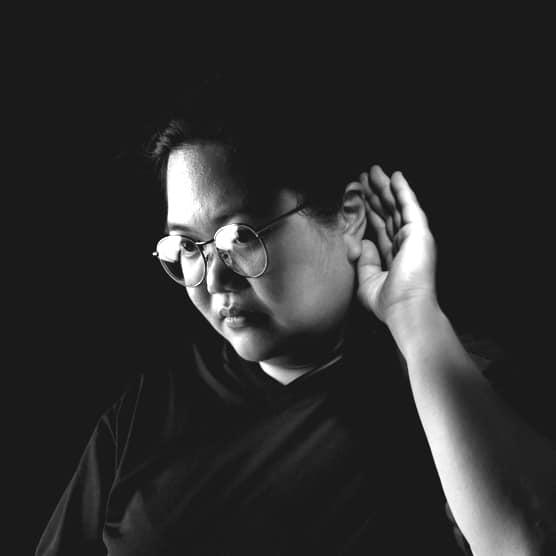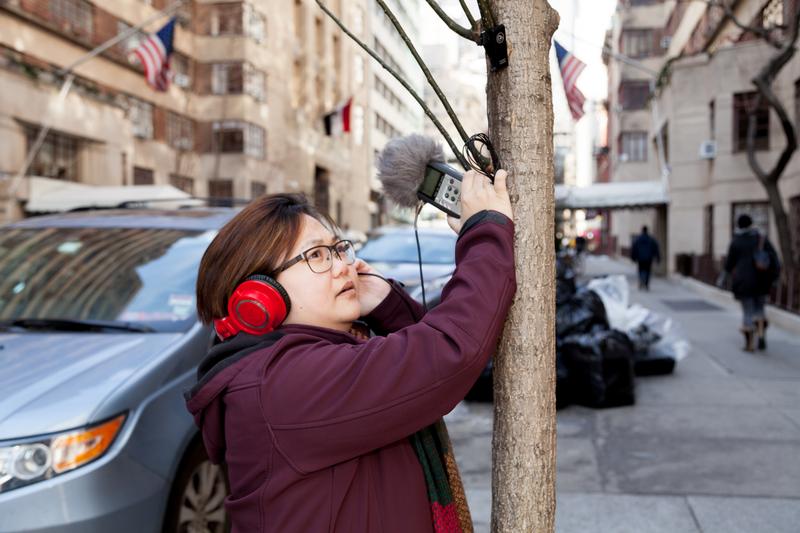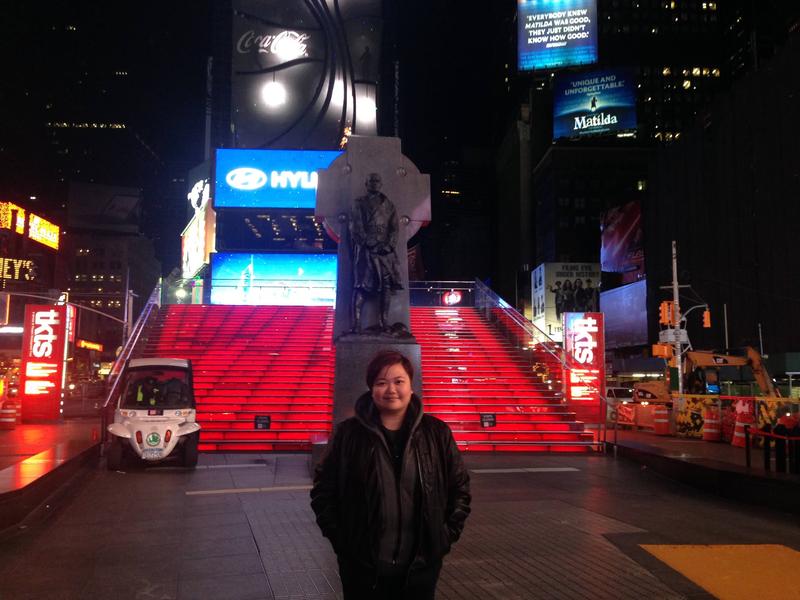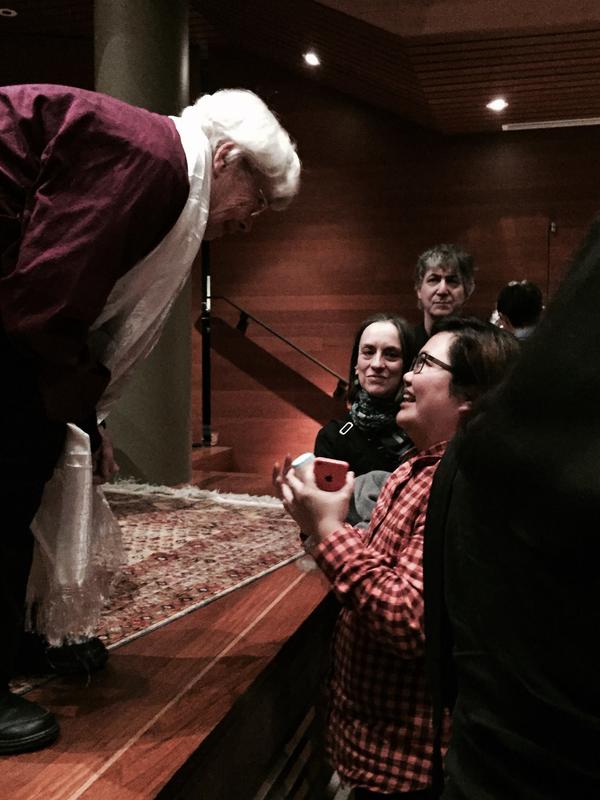 Teresa BARROZO (ACC 2014) is a sound artist, composer, and curious listener. In 2014, Barrozo traveled from the Philippines to the U.S. for four months on her ACC Fellowship to observe and research current practices, processes, innovations, and philosophies in music and sound art. Barrozo’s compositions have been featured in the Asian Composers League Festival in Japan and Thailand, and in Asia-Pacific Week in Germany. Her film music work has been featured at major international film festivals in Cannes, Venice, Toronto, Locarno, and Berlin. In 2021 her music and sound score were featured at the Expo 2020 Dubai Philippine Pavilion, and in 2023 her composition was featured in the Film Fest Gent 2x25 project.
Teresa BARROZO (ACC 2014) is a sound artist, composer, and curious listener. In 2014, Barrozo traveled from the Philippines to the U.S. for four months on her ACC Fellowship to observe and research current practices, processes, innovations, and philosophies in music and sound art. Barrozo’s compositions have been featured in the Asian Composers League Festival in Japan and Thailand, and in Asia-Pacific Week in Germany. Her film music work has been featured at major international film festivals in Cannes, Venice, Toronto, Locarno, and Berlin. In 2021 her music and sound score were featured at the Expo 2020 Dubai Philippine Pavilion, and in 2023 her composition was featured in the Film Fest Gent 2x25 project.
We spoke with Barrozo to discuss how her ACC grant experiences impacted her work then and now. Read the full interview below:
ACC: How did you first hear about ACC and what was your grant work about?
TB: When I applied for my ACC grant, I applied with a portfolio as a film and theater composer and collaborator. But in my application, I also told ACC I wanted to study sound. I had a curiosity about the power and possibilities of sound, and I wasn't even a sound artist then. That's why ACC had a really big impact on my life.
I started being curious about sound because of my practice with music composition in film. As a composer and film scorer, I've learned that it's not just about melodies or rhythm, but also giving out an emotion or trying to evoke a feeling. I also worked closely with sound designers in film and saw how they directed simple sounds to change a narrative and influence audiences outside the dialogue. I started to feel like music and sound were one and the same, and that maybe sound had a larger power over our lives, even beyond theater. But I didn't know who to talk to about these things, so I'm so grateful for ACC. Because of ACC, I was able to meet institutions and artists who had similar philosophies to me and who had been working with sound and music and listening in this way.

Field recording in New York City
ACC: Your Fellowship in 2014 with ACC was to observe and research current practices, processes, innovations and philosophies in music and sound art. How was your experience, and do you think your time in the U.S. broadened your perspective and practice in your art and life?
TB: I heard about ACC because big artists in my country had gotten Fellowships from ACC. I honestly felt that I would not be the kind of person to receive an ACC grant because I didn't really feel like I had a sound practice. What I did have was a job that put me in the world, working with film scores and as a sound designer collaborating with dance artists. But the person who recommended me, who really pushed me was Myra BELTRAN (ACC 2011) who was also an ACC Fellow. I'm very grateful to her because she knew I had been practicing in theater and with other artists and film, and she really pushed me to apply and just try because she knew I wanted to learn more.

Barrozo in Times Square
It was difficult because it was also my first time receiving a fellowship or residency, so I didn't fully know what to do when I arrived, but I knew I wanted to learn and start making artworks that were mine, not just collaborations or projects under a film.
Initially, I had a hard time with my ACC Fellowship because I was not used to the cold weather coming from the Philippines, and I wasn’t exactly sure how I was supposed to spend my time and money with so much freedom to explore the culture. But one of the biggest lessons I learned was from an ACC alum who told me, “You'll realize that you've learned most of your learnings from ACC years after your fellowship ends.” I had this expectation that I would study things and apply them immediately to effectively learn. Of course, I did learn technical things, explore, discover new practices, contemporary works, etc. but the biggest thing I learned from my fellowship was introspection; it taught me how to breathe. It taught me how to be human, to accept that you're human. To this day, I always tell people at workshops or interviews to not forget we're human first before anything else. I say it because I need to remind myself of that as well. I thought going to a residency would give me technical skills, but it was also something spiritual for me.
 Barrozo meeting Pauline Oliveros
Barrozo meeting Pauline OliverosACC: What do you think spurred this spiritual and personal impact on you during your ACC grant period?
TB: I had a lot of time to think, and that was definitely a gift because I didn't have that in the Philippines. In my first week, I went to Rensselaer Polytechnic Institute (RPI) and learned about deep listening, a practice of Pauline Oliveros.
I didn't know what deep listening was, so I explored it and found that sound and listening were not the same, and I needed to explore listening to be more aware of sound. Another significant discovery for me was learning about acoustic ecology. I went to Arizona State University to attend a workshop on field recording and many of the artists and scholars I met there, I am still connected with now. At first, I was insecure that most people around me had PhDs or were already big artists or professors, and I felt out of place, but they were so welcoming and open to my questions. Because of that experience, I became very open with asking basic questions and was met with answers that changed my world and perspective. To be in a room where the people were talking about sound, listening to and studying the environment using sound; it grew on me. And now my fascination is with sound. How sound can change societies, affect communities, and influence a nation.
That is all to say, thank you to ACC, because through that experience, I was able to grasp these ideas early and have time to practice and now even share it with different communities.
ACC: Artistically, was there anything particularly memorable from your ACC experience that impacted your work?
TB: One thing I thought about later was the disciplines. Originally, it was hard for me to look for the sound scene in the U.S., so I was doing a lot of research about other fields and disciplines that I didn’t know I’d be able to use. But by visiting galleries and going to concerts, I ended up checking out other practices, and now I realize all these experiences – even if they weren’t actually sound-based – really informed my worldview and work. My medium is still music and sound, but the way I tell my narratives is also very visual and embodies knowledge of other disciplines. It really helped me to develop my practice, and now I tell people that if you want to learn sound or film scores, I highly recommend that you learn other disciplines to inform how you think about scenes or collaborate with your directors.

Field recording in Arizona
Overall, ACC has given me a lot. Now I'm at a point in my life, especially after the pandemic, where I sometimes think of not wanting to be an artist. I know I'm continuing to make work, but also, I think about if the question shouldn’t be about my art changing the world, but instead how my art has changed me.
Follow Teresa Barrozo: Instagram | Facebook | X | SoundCloud | IMDb
All images courtesy of Teresa Barrozo
 ACC New York
ACC New York